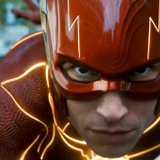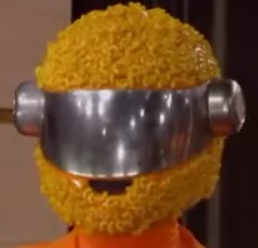ac/dc comics
Is DC's New 'The Flash' Movie Really Good Or Really Bad? Here's What The Reviews Say

DC has tried many, many times to get a solo Flash movie off the ground, only to be stopped by rewrites, creatives leaving the project, a global pandemic and some seedy behavior by its star Ezra Miller.
Some thought "The Flash" would be shelved forever, or released at a much later date, but here we are, about as the film will premiere on June 16, 2023. It stars Sasha Calle, Michael Shannon, Ron Livingston and two Batmans, played by Ben Affleck and Michael Keaton. Here's what the reviews say about this time-travel/multiverse cameo-laden comic book superhero adaptation.
The premise
If you've seen even one other time travel movie, you know where this is going, though with a bit of a twist. Barry goes back in time, pops the can of tomatoes into his mother's shopping cart, and then zips ahead to rejoin her in his current timeline. Except, it's not his current timeline (he's about a decade too early), and when he arrives back at the Allen casa, he's met with a happy mother (Maribel Verdú), a happy father (Ron Livingston), and a very confused younger Barry (also Miller, now sporting a floppy haircut and a laid back attitude). But while Barry did save his mom, he also upended just about everything else in the process, to the extent that there's no longer a Justice League, and thus, no one there to save Earth when Michael Shannon's evil General Zod (last seen in 2013's "Man of Steel") arrives, World Engine and all. The butterfly effect, heard of it?
Over the last few years, movie-going audiences have been inundated with multiverses. "Spider-Man: Across the Spider-Verse" is currently making a dent at the box office, following up on the also-excellent "Into the Spider-Verse," Marvel has been playing with the possibilities of multiple timelines for years now, and "Everything Everywhere All at Once" won the Best Picture Oscar earlier this year. Not only is the multiverse as a storytelling tool a way for characters that seemingly could never meet to finally come together, but it's also a way to indulge in extreme fan service — which can be a good or a bad thing.
The CGI is bad and cheap looking
Because the movie lays the CGI on thick, Miller often appears as a non-playable character moving through an ugly, overstimulating mélange of grotesquely conceived imagery. Even their face appears to be superimposed upon the Flash's body when in-costume. The moments when the Flash enters that award-winning Speed Force (or runs wildly in place, in a clear nod to the "Cosmic Treadmill") only make those practical scenes in which Miller's two Barry Allens quip with each other, shed tears in memory of their mother, or teach each other about how to be a proper superhero much more enjoyable. But even the speedster can't move quickly enough to avoid getting stuck in the VFX sludge.
Then, it throws all that away for a grotesque, digitally rendered parade of IP branding. I can't remember the last time I turned on a movie so quickly. It goes from something I wish these movies could be more often to everything I hate about the modern state of them within the span of 10 seconds. It's a pitiful disservice to itself, turning a relatively fun, if rocky, movie into nothing but another product designed as a carousel where you can point at things and people you recognize. The final 10 minutes of "The Flash" are absolutely defeating.
Talking about Ezra Miller is akin to opening Pandora's Box
The movie, which has been tainted by Ezra Miller and their actions outside of filming, has a lot working against it. Unfortunately, it's not great enough to justify all the praise it initially got, especially in the face of all of that. I truly do believe part of my "Oh, okay, this is just less exciting Flashpoint" attitude comes from the fact that most of the initial reviews praised it enthusiastically, ignoring Miller's troubles to do so — and in watching the film, I don't understand why.
Miller is on double duty and manages to nail both performances. Director Andy Muschietti, perhaps best known for the "IT" movies, gets two very different versions of Barry Allen, one we are familiar with and a younger one who has echoes of everything from Emo Philips and Pauly Shore to Keanu Reeves's Ted Theodore Logan in the exuberant big brother-little brother mechanic. They gel beautifully when it could have been jarring, annoying, and an awkward dynamic, and the connection develops nicely as the movie tears along. Allen's relationship with his mother is also handled perfectly, adding humanity and vulnerability that elevate and add authentic texture to the film.
Michael Keaton returns
For a lot of movie fans, though, Miller was never why they planned to show up for this film. That honor goes to Keaton, who's undeniably good in his return as Bruce Wayne, even if he does have to shoehorn a couple of his famous lines from 1989 into this film. There's an ease and a grace that comes from his presence which makes the film better even when it's clumsy, and you'll be reminded why you love him as an actor and as a big-screen Batman. Throw in Calle as the rough-edged, uncertain hero trying to find her way, and you've got a solid ensemble, along with enough cameos to leave your head spinning.
"The Flash" truly ends up being an ensemble piece, and the performances help glide the film through moments that might otherwise not land. Miller's take on the multiple Barrys is filled with exuberance, and they clearly have a stronger stamp on the character than in their supporting appearances in previous films. Keaton's return to Batman is missing some bite, especially compared to his quasi-Batman parody in "Birdman", and his more recent superhero role as Marvel's Vulture, but is still a delight to watch nonetheless. Calle's Kara is stellar, capturing the heroine's very specific combination of rage and earnestness in every second of screen time — but by the time the movie's over, it feels like we've just barely gotten to know her.
It's one big pop culture mashup
In pivoting from time-travel caper into multiversal doomsday epic, Muschietti treats Barry’s emotional arc of acceptance less as the heart of "The Flash," and more like its bookends, an experience Barry grows from in the hopes that the audience will also find it worthwhile. But so much of the substance of "The Flash" isn't for Barry. It's for the DC stalwarts who'll get all the meta nods and in-jokes. The movie is a chronicle of corporate synergy, mashing together the old and new in an attempt to lure DC fans from across generations, with the assumption that meaning will emerge from mere recognition.
"The Flash" contains pop culture references, cameos, and Easter eggs galore — juicy moments people are definitely going to be talking about, and ones that will absolutely be spoiled online on opening night. Your mileage may vary on how well those work for you (most general audiences will surely be left baffled by one particular cameo that only hardcore DC fans or regular movie news readers will understand), but again, the fact that the movie can withstand all of these diversions and still maintain a strong emotional core is a testament to the power of the script by Christina Hodson, John Francis Daley & Jonathan Goldstein, and Joby Harold.
Decades later, "The Flash" seems downright terrified that audiences will revolt at prolonged exposure to actual human bodies — that an actual punch won't land like a slow-mo CG cartoon fist-blast. The movie also pulls in a righteously pissed-off version of Superman's cousin Supergirl, and Sasha Calle's obvious presence and charisma begs for a fuller-bodied character than her hints of alienation and mostly-animated ass-kickings. These are endemic superhero problems that, with any luck, no one will be nostalgic for in 2033 (though, given that you can find fans online clamoring for a 2005 "Fantastic Four" reunion tour, anything is possible). Yet while "The Flash" director Andy Muschietti lets bad FX, in-joke cameos and muddled time-travel mechanics sprawl out on the couch and stay awhile longer, within its template the movie does have a peculiar, likable energy.
The thing is, none of it makes a lot of sense. In "The Flash," the multiverse of possibilities that opens up by toying with the past becomes an excuse to throw everything but the Batcave sink at the audience. Despite the vividness of its star, the movie steamrolls Ezra Miller's personality as it goes along. The climactic battle against General Zod, with its kamikaze Batplane death zooms, its plumes of black smoke rising from the ground, its overblown sound and fury, is working too hard to engulf us after a story that did a nifty job of beguiling us. For a while, Ezra Miller brings it. But they deserved better, and so do we.
TL;DR
Maybe nerd culture was a mistake.
A morally specious movie that's mostly about reflogging the cultural canon of an entertainment conglomerate.
The superhero fan service is strong with this one (perhaps too strong at times) but it never fully overshadows Barry Allen's genuinely tragic and heartfelt story of grief.
"The Flash" is, by far, the best movie to come out of this modern, post-Nolan Warners/DC collaboration.
